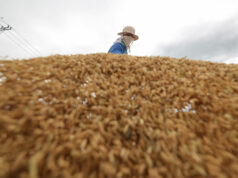TDF yields dip as demand soars
YIELDS on the Bangko Sentral ng Pilipinas’ (BSP) term deposit facility (TDF) dipped anew amid higher bids as liquidity improved.
Bids for the term deposits offered by the BSP on Wednesday amounted to P360.02 billion, going beyond the P150 billion auctioned off and also higher than the P353.789 billion in tenders seen last week for the P180 billion up for grabs.
The seven-day papers fetched bids totaling P268.44 billion, more than double the P120 billion on offer as well as the P284.139 billion in tenders last week for the P120 billion on the auction block.
Rates for the one-week papers ranged from 2.25% to 2.2508%, a tad narrower than the 2.25% to 2.2515% range logged on June 10. This caused the average rate for the seven-day papers to settle at 2.2505%, down by 0.02 basis point (bp) from the 2.2507% recorded last week.
Meanwhile, tenders for the 14-day papers hit P91.58 billion, surpassing the P30 billion offered by the central bank as well as the P70.65 billion worth of bids logged the previous week.
Banks sought yields from 2.25% to 2.252% for the two-week term deposits, a slightly slimmer band than the 2.25% to 2.254% logged last week. With this, the average rate for the 14-day papers settled at 2.2512%, dipping by 0.08 bp from the 2.252% logged on June 10.
The TDF is the central bank’s main tool to mop up excess liquidity in the financial system and to better guide market interest rates.
Term deposit auctions were suspended in March to provide liquidity during the lockdown. In mid-April, the BSP started offering the seven-day term deposits again, while the auction for 14-day papers resumed last week. Meanwhile, the one-month tenors have not been offered since March.
“Market appetite for the BSP’s deposit facilities remain very strong amid ample financial system liquidity,” BSP Deputy Governor Francisco G. Dakila, Jr. said in a statement.
BSP Governor Benjamin E. Diokno earlier said they have observed “significant” increase in liquidity in recent months.
M3, the broadest measure of money supply, rose 16.2% to P13.6 trillion in April, accelerating from the 13.3% pace in March, BSP data showed. This is its fastest pace since the 16.4% logged in September 2014.
Mr. Diokno said investors need not worry as “there is no threat that excess liquidity will translate into higher inflation”.
Inflation in May eased to 2.1% from 2.2% in April and 3.2% a year earlier, on the back of a decline in food and transport prices during the lockdown, data from the Philippine Statistics Authority showed.
Before the pandemic, TDF yields were slightly above the overnight reverse repurchase rate which currently stands at 2.75%, said Rizal Commercial Banking Corp. Chief Economist Michael L. Ricafort.
“Thus, markets may have priced in possible cut in local policy rates, amid relatively higher peso liquidity in the financial system,” he said in a text message.
The BSP has slashed policy rates by 125 basis points this year, reducing the overnight reverse repurchase, lending, and deposit rates to record lows of 2.75%, 3.25%, and 2.25%, respectively, in a bid to cushion the economic impact of the virus.
Earlier, Mr. Diokno said they are “happy” with current rates but assured the central bank has ample space to do more when the worst comes.
The Monetary Board is set to have its next policy-setting meeting on June 25. — L.W.T. Noble



